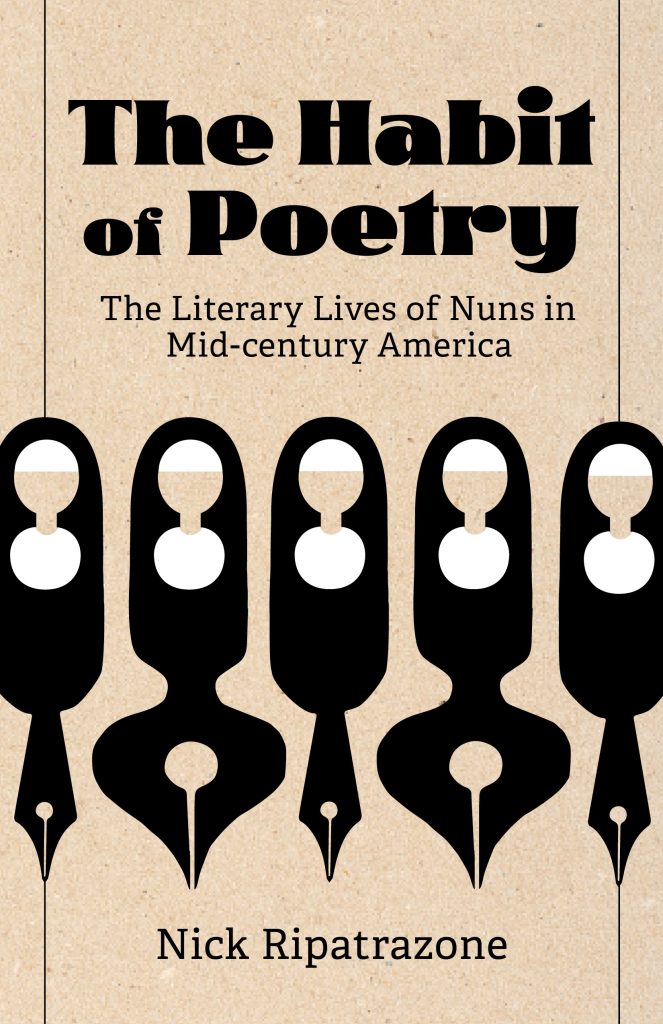The following is an excerpt from The Habit of Poetry: The Literary Lives of Nuns in Mid-century America (Fortress Press, May 9, 2023)
“You hold me only when you set me free.” When asked by Life magazine—which featured a profile of her in the June 10, 1957, issue—how she approached discipline as the president of an all-women’s college, Sister Madeleva Wolff said her method was “the relaxed grasp.” She then quoted the clever line from one of her own poems, capturing the paradoxes of religious life. Wolff was a sister for most of her life, but her structured existence was not stricture, but source.
Wolff was born on May 24, 1887, in Cumberland, Wisconsin, a roughly two-mile-long island in Beaver Dam Lake, which she called “one of the deep loves of my life.” Far from any Catholic schools, Wolff had a public education. She loved to read, but was neither drawn to her English teachers nor the subject itself in school. She attended the University of Wisconsin, and enjoyed her first year there. She spent summer break home with her old “crowd”: “We talked, danced, swam, motored by land and water…We came home bronzed with tan and starved for sleep.”
Amidst that summer fun, though, Wolff longed for something more. She noticed an advertisement for Saint Mary’s College in Notre Dame, Indiana, an all-women’s Catholic school. She transferred, and the decision began her journey as both a nun and a poet, as the two identities were later inextricable from each other. Wolff was drawn to Sister Rita Heffernan, a Harvard-educated professor who would go on European trips with Elizabeth Jordan, the editor of Harper’s Bazaar. Sister Rita assigned a lyric verse project, but Wolff was nervous. She felt that she couldn’t write original poetry, and ultimately translated some verse by Johann Wolfgang von Goethe. The attempt at original work, despite the struggle, stirred Wolff. “I had come upon a manner of writing that I had never tried or been taught to use before,” she reflected. “The discovery exhilarated me. After that I would lie awake at night trying to fashion every lovely thing I knew into verse. I had found my medium.”
Her religious devotion came next. An independent spirit from her public school days, Wolff eschewed the college’s rules. Some days she would skip class and instead go outside; when pressed by the school’s prefect, Wolff was curt: “Sister, some of the rules, I think, are rather foolish.” She changed her perspective, though, after a religious retreat, when she concluded “the religious life was what I most desired and for which I had most completely disqualified myself. God did not make sisters out of girls like me.” Yet she had been changed for good: “I will do anything that God wants me to, if I can only find out what it is.”
After her second year at Saint Mary’s, Wolff made a decision. Despite doubts that a young woman such as herself could become a sister, she felt compelled to pursue a religious vocation, and decided to become a Sister of the Holy Cross. Originally founded in France
in 1841, the congregation soon moved to Notre Dame, establishing Saint Mary’s College. Wolff entered the congregation on September 14, 1908, and on December 10 received her habit, and the name of Sister Mary Madeleva.
During the next decade, she taught literature, theology, and philosophy at the college—and would later become its president—but never forgot how poetry had captivated her. She enrolled in a Master’s program in literature at Notre Dame, and was heartened that her professor thought one of her sonnets was worthy of publication. Wolff made a promise to herself: “Two rules I set for myself at the very beginning. I would publish under my religious name. I would submit my work first to secular rather than to Catholic magazines. I had heard so much about Catholics being unable to receive recognition because they were Catholics. I resolved not to permit mediocrity in my writing to be attributed to my religion. As a Catholic and a sister I would write well enough for acceptance by the secular press, or I would not write at all.”
Wolff’s ars poetica is a fitting manifesto for The Habit of Poetry, my book about nun and sister poets. These women published in the leading magazines of the day. Their poems were neither trite nor provincial. Their work was a minor literary renaissance—an inspiring, and yet sadly forgotten story of how one group of women negotiated tradition, ambition, and creativity.
A university president, a writer, and an activist for the religious formation of women, Wolff pushed her own body to the limit. The paradox of the body as a source of frailty and wonder, and the constant presence of death, is the anchor of her verse. In the titular poem from her 1923 debut, Knights Errant and Other Poems, she writes: “Death is no foreman, we were born together; / He dwells between the places of my breath.” Poems like “Sister Death” are direct in their memento mori, while others, like the brief “Wind Wraith,” whisper a melancholy awareness of mortality: “A shy ghost of a wind was / out / Tiptoeing through the air / At dawn, and though I could not see / Nor hear her anywhere, / I felt her lips just brush my cheek, / Her fingers touch my hair.”
In “Of Wounds,” from A Question of Lovers and Other Poems (1935), Wolff imagines how Mary might have encountered the resurrected Christ. “Being His mother, I had wished His body flawless,” Mary speaks, “Fearing to think how beautiful might be / Five wounds upon it. / I know now they are as beautiful as God.”
Although Wolff wrote her share of devotional verse, she would be the first to admit that “there is no reason, anyway, why a nun should write pious poetry.” Perhaps her finest verse is not directly about God. Her most accomplished book, Four Girls (1941), stands well against the secular work of its period. In these poems, Wolff creates an internal, recursive profluence to her lines, as with perhaps her most famous poem, “Snow Storm.” All but one of the poem’s ten lines are endstopped with periods or semicolons, which might seem like a stilted punctuation choice for recursivity, but Wolff’s method is sound. The first line is a single sentence: “The air is white and winds are crying.” The first clause is a literal, visual description, while the second clause is acoustic and more metaphorical. The sentence arrives as a complete thought, although the poem’s second line completes the first: “I think of swans in Galway flying.” The effect is deft; Wolff is able to create a simultaneous yet connected narrative, in which observation and memory are inextricable.
The two narratives turn within each other in both syntax and sense, as Wolff’s stanzas smoothly reveal: “Winds are birds; snow is a feather; / Wild white swans are wind and weather.” The swans, flying against the background of the sky and pushed by wind, become the weather itself. Wolff ends with a stanza that contains her only enjambed line: “Winds are white with snow but alway / Mine are white with swans from Galway.”
Wolff was aware, consciously or not, that poetry was uniquely suited to the identity of women religious. In her preface to The Four Last Things, her collected poems, she wrote that poetry “is a distillation, not a diffusion; a high concentrate, not an atomizer.” She believed that “the cloistered monastery is of all places the most perfect home of the most perfect poetry.” It is typical to imagine religious life as suffocating; a place where art goes to die. Wolff complicates that stereotype, and she is not alone.
Religious life is repetitive. Yet within that repetition are the bends and turns of habit which offer quiet revelations. In “The Theme,” one of her early poems as a sister, Wolff’s narrator speaks to God of her daily prayers, in which she fears she is being repetitive: “Until I fear that Thou must wearied be / To have no other speech than this from me.” The narrator imagines God’s response: “Do not tire of the tireless sun, the constant sky, / The faithful stars forever slipping by?”
It is the poet’s work to document this world of wonders, tired as we may become of this world’s struggles. In the middle of the twentieth century, a group of poets—nuns and sisters, believers and doubters—spoke their truths. As Wolff wrote to the superior of a young nun who wished to share her poetry with the wider world, “I often wonder at the lack of trust we show in these gifts [of God] when they are bestowed within the beautiful security of the cloister.” The complex gifts of God transcend that beautiful security, and the work of these Catholic poets is worthy of our attention.
Image: Crop of the cover of Habit of Poetry, courtesy of Nick Ripatrazone
















Add comment